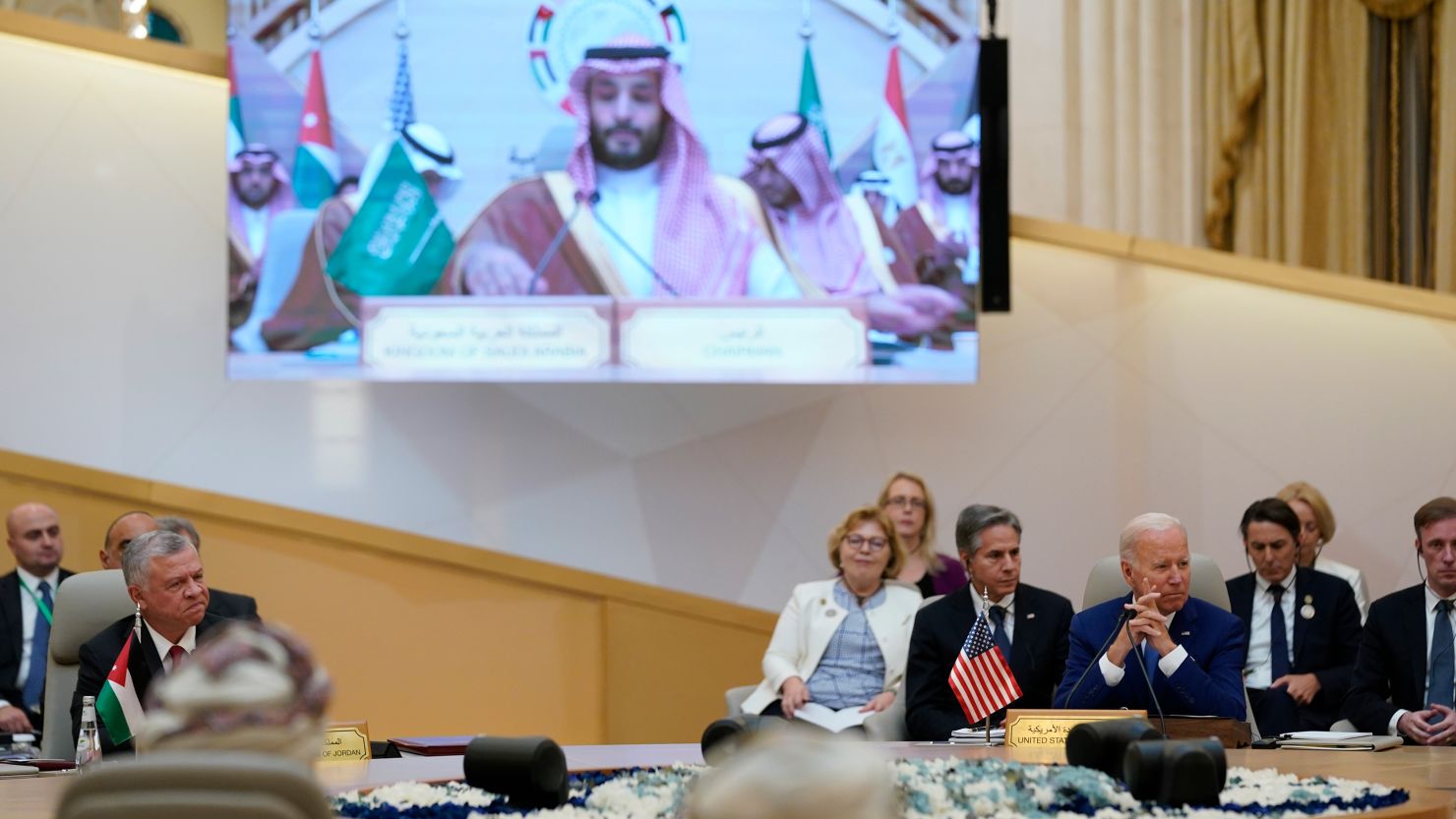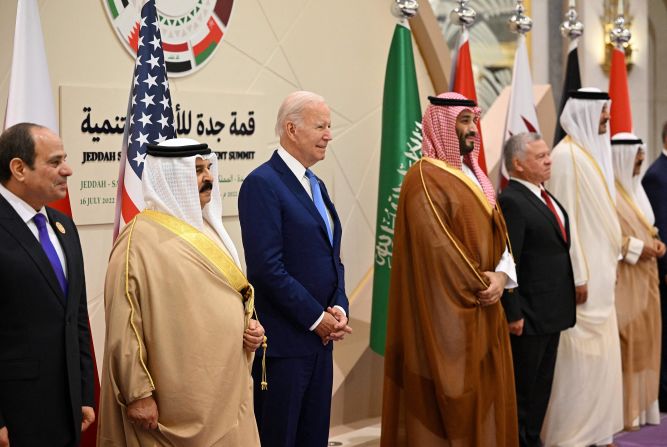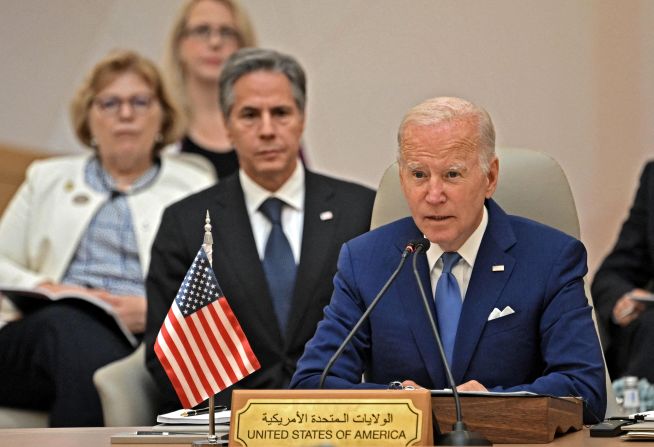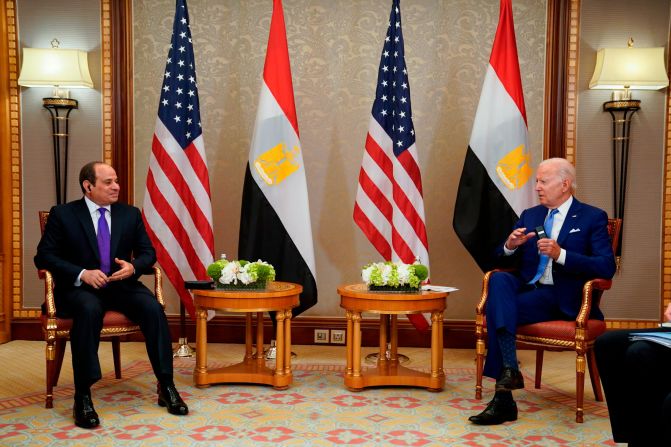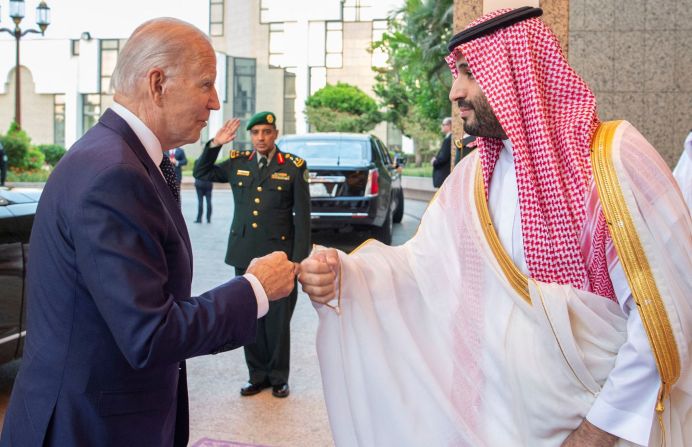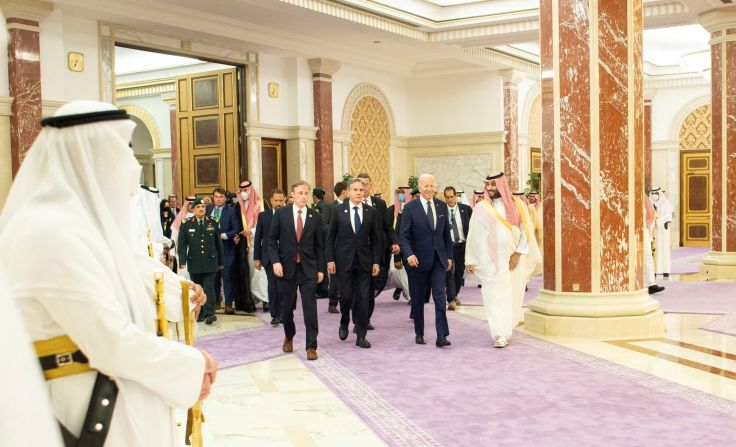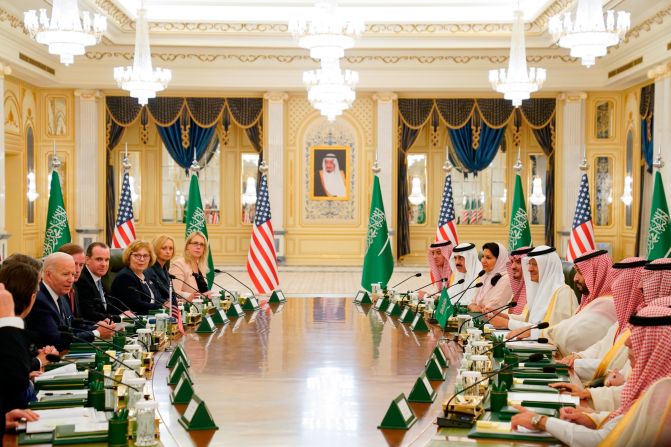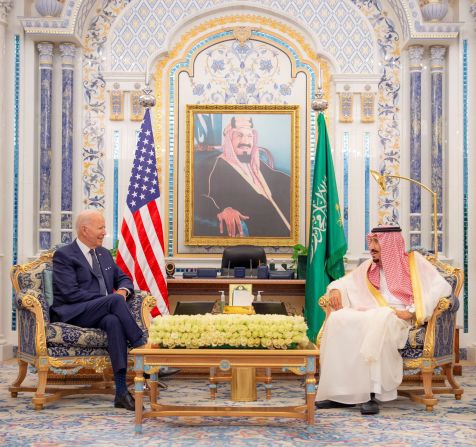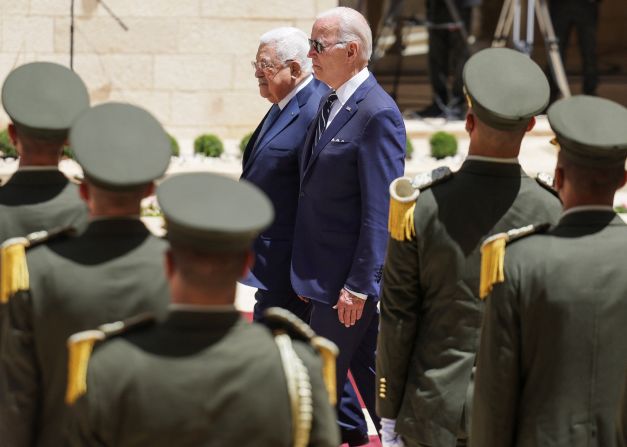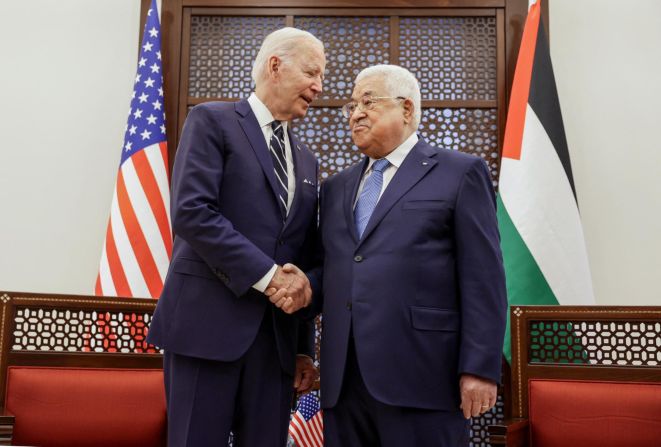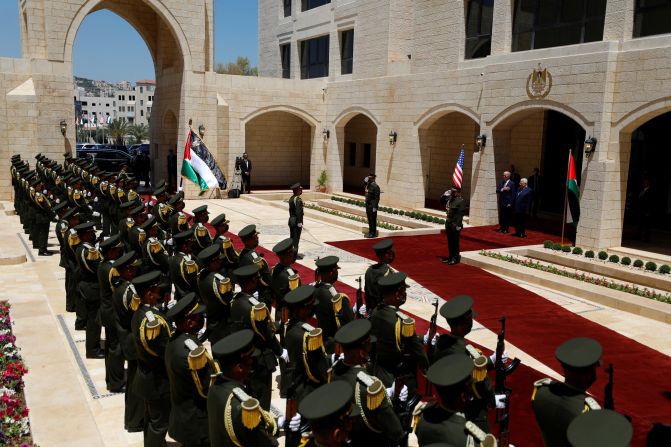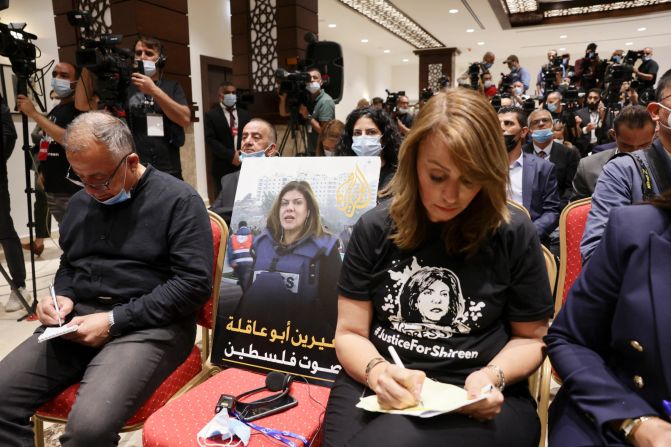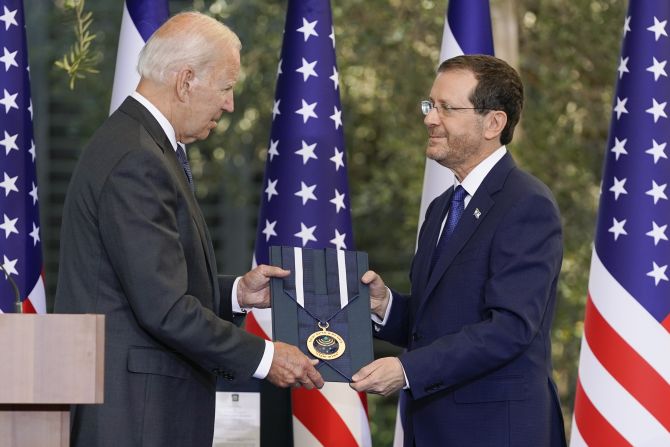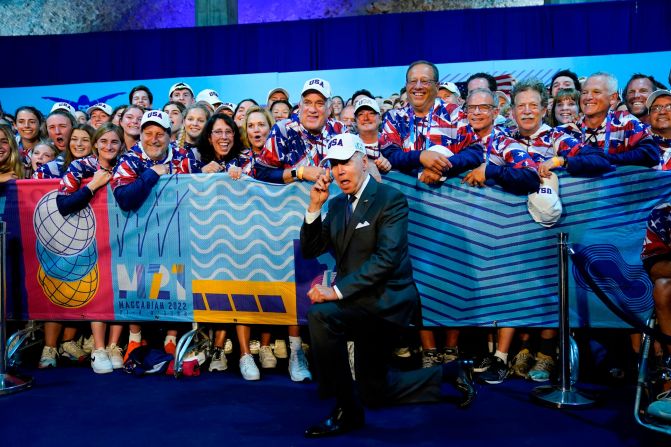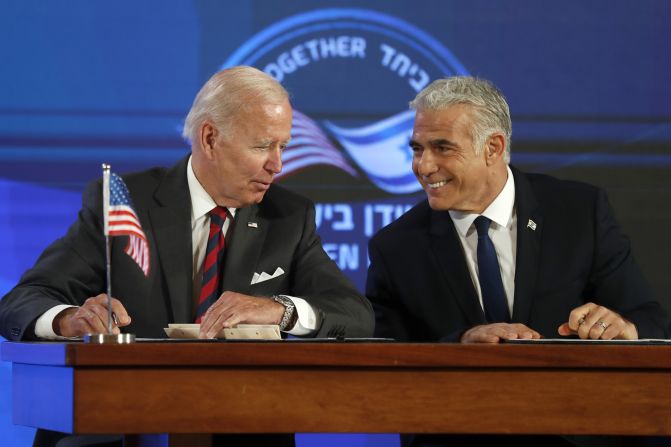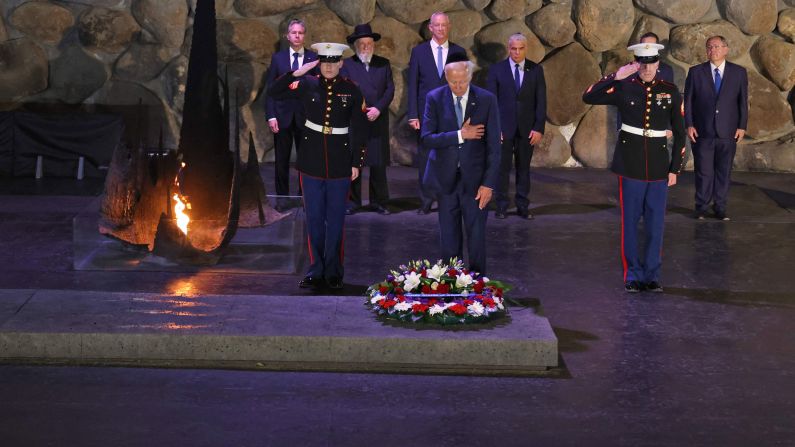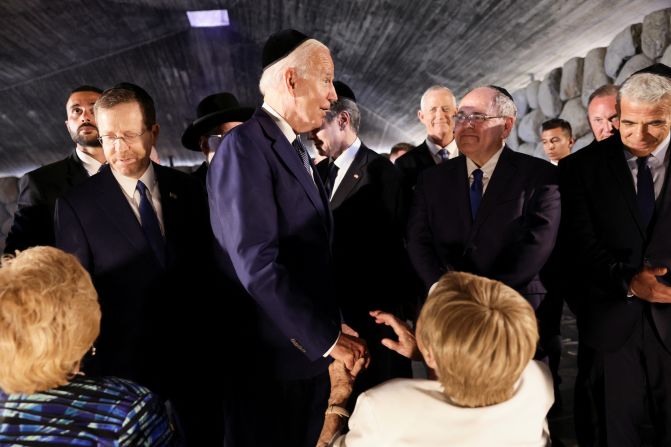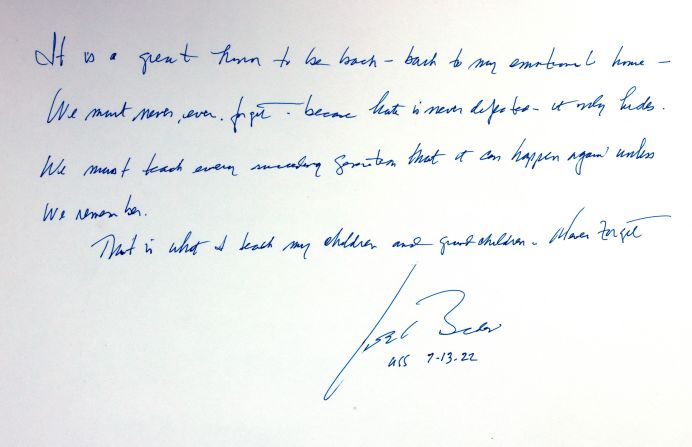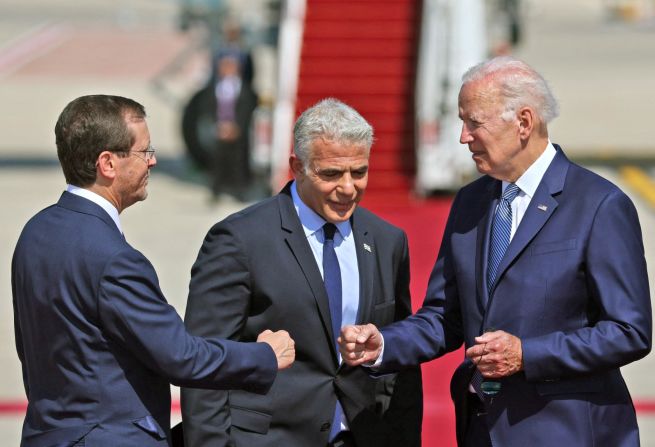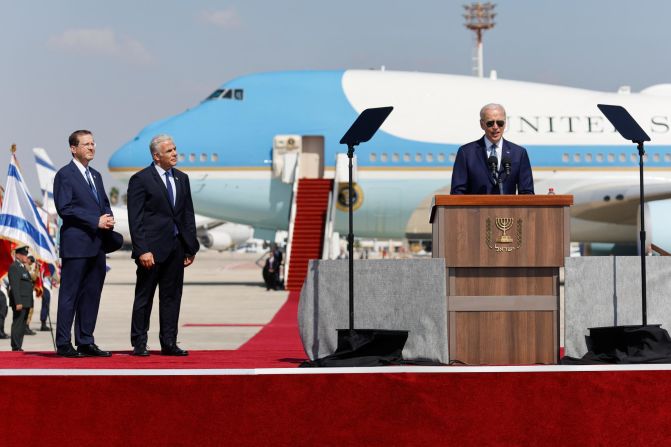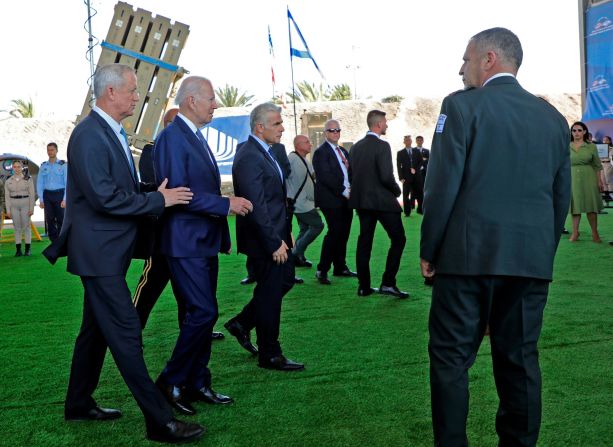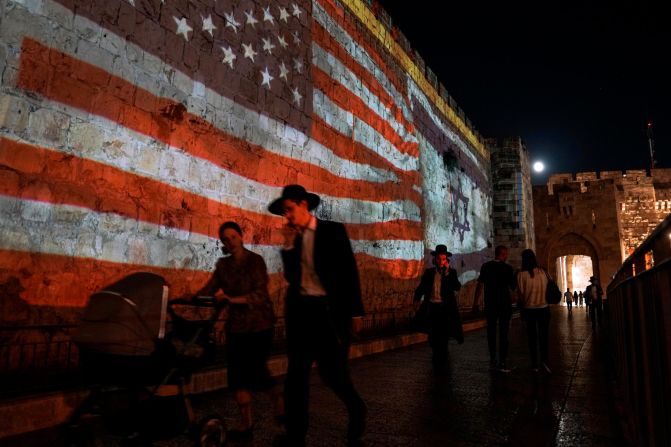President Joe Biden on Saturday attempted to reassert US leadership in the Middle East as he met with key leaders in the region, promising his administration would stay engaged amid fears China and Russia would swiftly fill a leadership vacuum.
The President said American leadership in the Middle East would focus on using diplomacy to strengthen alliances and build coalitions, and that the US’ objectives would remain “focused, realistic and achievable.”
His speech comes nearly one year after the US withdrew all military troops from Afghanistan and ended 20 years of war in the country. He noted his visit to the Middle East was the first time since the September 11 terrorist attacks in 2001 that a US President visited the region without American troops being engaged in combat in the region, though US forces continue to conduct operations in Syria.
Biden’s foreign policy since taking office has largely focused on countering China’s growing geopolitical influence and Russia’s war in Ukraine, which has raised questions about the extent of the President’s commitment to engagement in the Middle East. But on Saturday at a summit in Jeddah, the President sought to assure other Middle Eastern leaders – and the rest of the world – that the US still sees the region as crucial to its foreign policy goals.
“Let me state clearly that the United States is going to remain an active and engaged partner in the Middle East,” Biden said at a summit attended by key leaders on the last day of his Middle East swing.
The President said, “As the world grows more competitive, and the challenges we face more complex, it is only becoming clearer to me how closely interwoven our interests are with the successes of the Middle East. We will not walk away and leave a vacuum to be filled by China, Russia, or Iran.”
The President announced $1 billion in aid to food security assistance in the Middle East and North Africa on Saturday. The President also announced Gulf Arab leaders are pledging more than $3 billion over the next two years in projects that align with global infrastructure and investment.
The President said the US would focus on supporting countries “that subscribe to a rules-based international order,” including helping those countries defend themselves against foreign threats. He thanked the leaders present for voting to condemn Russia’s invasion of Ukraine at the UN General Assembly and called it a “watershed moment” that showed “the core values” of the region.
He spoke of the importance of protecting the “freedom of navigation” through waterways in the Middle East, which allows for the free flow of commerce and resources throughout the region. Biden said the US has established a new naval task force to work in partnership with Middle Eastern countries to help secure the Red Sea.
Biden said the US would “work to reduce tensions, deescalate and end conflicts wherever possible.” He pointed to the truce in Yemen – its first nationwide truce in six years – as an example of successful diplomacy. He again vowed to never let Iran acquire a nuclear weapon.
The President also touched on human rights as he sat beside Saudi Crown Prince Mohammed bin Salman, calling the values enshrined in the UN charter “foundational to who we are as Americans.”
“I’ve gotten plenty of criticism over the years. It’s not fun. But the ability to speak openly, exchange ideas freely, is what unlocks innovation,” Biden said.
In pictures: Biden's trip to the Middle East
Biden held several bilateral meetings with leaders from Iraq, Egypt and the United Arab Emirates, and participated in a GCC+ 3 summit on Saturday. The GCC+ 3 is made up of the Gulf Cooperation Council (GCC) – an alliance of Saudi Arabia, Kuwait, the United Arab Emirates, Qatar, Bahrain and Oman – plus Egypt, Iraq and Jordan. He departed Saudi Arabia for Washington after wrapping up his meetings.
Large parts of the region have been embroiled in economic turmoil in recent years exacerbated by the pandemic. Russia’s invasion of Ukraine and Moscow’s stifling of Ukraine’s vast wheat exports have also pushed much of the Middle East and North Africa to the brink of wide-scale food insecurity.
Biden came to Jeddah seeking solutions to one of his top political problems at home – sky-high gas prices – as diplomacy with Saudi Arabia in the Middle East was seen as one of the few routes he could take to bring down prices that are putting strain on millions of Americans.
But White House officials say the President won’t be returning to Washington on Saturday with explicit oil production increases. The expectation is that there will be increases in the months ahead – done within the context of increased output levels in the OPEC+ cartel laid out at its August meeting.
In his remarks to the summit, bin Salman said joint international efforts were needed for the recovery of the global economy and that “unrealistic policies” on energy would lead to “unprecedented inflation.”
“Adopting unrealistic policies to reduce emissions through the exclusion of the main sources of energy, without taking into consideration the impact of these policies on the social and economic pillars of sustainable development and global supply chains, will lead in the coming years to unprecedented inflation, increased fuel prices, increased unemployment and exasperation of dangerous social and security problems including poverty, famine, escalation of crime, extremism and terrorism,” the Crown Prince said.
Biden’s visit to Saudi Arabia has been closely watched. The President announced several new areas of cooperation aimed at reshaping US-Saudi relations on Friday, but it has been his interactions with the Saudi Crown Prince that have drawn the most attention.
The US declassified an intelligence report last year that concluded bin Salman approved the killing of Saudi journalist and Washington Post columnist Jamal Khashoggi. Despite once vowing to make Saudi Arabia a “pariah” on the world stage, Biden fist bumped the Crown Prince upon greeting him in Jeddah ahead of their meetings. Fellow Democrats and others decried the gesture as too friendly and said it sent the wrong message.
Biden later told reporters he raised Khashoggi’s killing directly with bin Salman and said he believed the Crown Prince was responsible.
He was met with Saudi pushback, according to a source familiar with the matter. The Crown Prince, the de facto ruler of the kingdom, told Biden any attempt to impose values on another country was viewed as counterproductive to the relationship. He then noted that there have been incidents, including the abuse of prisoners by US military personnel at Abu Ghraib prison in Iraq, that reflect poorly on the US.
The recent killing of Al Jazeera Shireen Abu Akleh in the West Bank and the US response, which has drawn criticism from Abu Akleh’s family, was also brought up by the Saudi side, the source said.
Senior administration officials on Saturday defended the trip as an opportunity to raise concerns about the kingdom’s rights record with the Saudi crown prince. It would have been “backsliding if the president didn’t come to the region and it would be backsliding if he didn’t and wasn’t willing to sit and raise human rights concerns with foreign leaders around the world,” an official said.
Responding to a question on Saturday about the possibility of a widely anticipated Saudi-Israeli normalization agreement, an official said “it’s going to take some time.”
The Biden administration has for months sought to formalize security and economic deals between Saudi Arabia and Israel, in a bid to set the stage for a normalization deal between the two countries.
Riyadh is believed to have a covert relationship with Israel but has yet to officially disclose those diplomatic ties. In 2020, then-Israeli Prime Minister Benjamin Netanyahu reportedly flew to Saudi Arabia for a covert meeting with the kingdom’s de facto leader, Crown Prince Mohammed bin Salman – a claim that was denied by Riyadh’s top diplomat.
A possible normalization between Israel and Saudi Arabia has been hailed as the “crown jewel” of agreements between the Jewish state and the Arab world. The United Arab Emirates, Bahrain, Morocco and Sudan normalized relations with Israel in 2020 as part of a wave of agreements at the end of former President Donald Trump’s term.
CNN’s Phil Mattingly, Allie Malloy and Betsy Klein contributed to this report.

